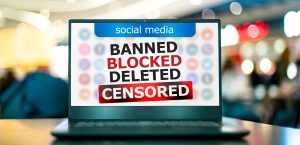 Websites like Facebook, Instagram, Twitter (now X), and TikTok give users unprecedented access to global conversations, but with this openness comes the need to regulate and moderate content. This regulation often leads to content removal, which many users perceive as censorship. The question is, when and why does content get taken down, and is it always justified?
Websites like Facebook, Instagram, Twitter (now X), and TikTok give users unprecedented access to global conversations, but with this openness comes the need to regulate and moderate content. This regulation often leads to content removal, which many users perceive as censorship. The question is, when and why does content get taken down, and is it always justified?
Violation of Community Standards
California, home to tech giants like Meta, Google, and Twitter (now X), moderation policies receive particular attention. With the state’s strong commitment to digital privacy, highlighted by legislation such as the California Consumer Privacy Act (CCPA), companies are expected to carefully balance user protection with maintaining transparency in content removal practices.
Each social media platform has its own set of community guidelines, which are designed to ensure a safe and respectful space for users. These standards typically prohibit certain types of content, such as hate speech, violent imagery, harassment, and explicit material. When users post content that violates these rules, platforms have the right to remove it to maintain the integrity of their community. Social media platforms use a combination of automated tools and human moderators to identify and remove such content. The goal is to protect users and create a space where everyone feels safe to participate.
Copyright Infringement
Users often share music, videos, or images without proper authorization, leading to legal repercussions. Platforms like YouTube and Instagram use advanced tools, such as Content ID, to detect unauthorized use of copyrighted material. Additionally, creators and rights holders frequently issue takedown requests to protect their intellectual property.
In these cases, content removal is not only a matter of platform policy but also a legal necessity to comply with intellectual property laws.
Political Censorship
In some cases, social media platforms may remove content due to pressure from governments. This is especially true in countries where criticizing the government is illegal. Political dissent, activism, or content deemed “dangerous” by a ruling regime can lead to censorship. Social media companies must balance between protecting free speech and complying with local laws to maintain operations in certain regions.
The U.S. & California Legal Landscape
In the U.S., debates on social media censorship often revolve around the First Amendment, which protects free speech from government interference. However, as private entities, social media platforms can establish their own content policies and are not bound by the First Amendment. Section 230 of the Communications Decency Act provides legal protections for platforms, shielding them from liability for user-generated content while allowing them to moderate that content in good faith.
In California, where many major tech companies are based, the legal landscape is further complicated by progressive legislation like the California Consumer Privacy Act (CCPA), which emphasizes consumer protection and privacy rights. Consequently, platforms must navigate a delicate balance between upholding free speech and complying with state and federal regulations. This challenge is particularly pronounced in their content removal practices, which are subject to increased scrutiny due to their potential impact on public discourse and political expression.
Conclusion
Navigating the complexities of content removal on social media requires a deep understanding of platform policies, legal frameworks, and evolving public expectations. From community standards enforcement and copyright protection to addressing political pressures, social media platforms must balance free expression with the responsibility to maintain a safe and lawful online environment. At Structure Law Group, LLP, we specialize in guiding businesses and individuals through the intricacies of content moderation and digital compliance. Whether you need advice on intellectual property rights, platform liability, or navigating California’s regulatory requirements, our team is here to ensure your digital presence remains compliant and protected from legal challenges.
Contact Structure Law Group, LLP at (408) 441-7500 or reach out to us online for expert legal guidance on social media and content moderation.
 Business Lawyers Blog
Business Lawyers Blog